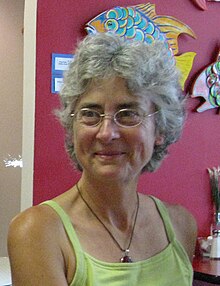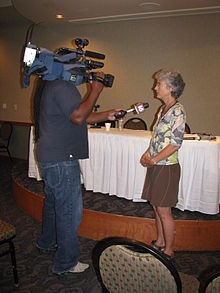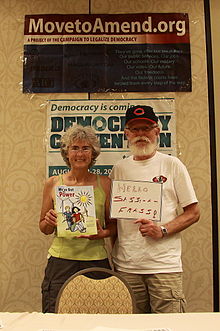
The Exxon Valdez oil spill occurred in the Prince William Sound, Alaska, on March 24, 1989. Exxon Valdez, an oil supertanker owned by Exxon Shipping Company bound for Long Beach, California struck Prince William Sound's Bligh Reef, 1.5 mi (2.4 km) west of Tatitlek, Alaska at 12:04 a.m. and spilled 10.8 million US gallons (260,000 bbl) of crude oil over the next few days.

Valdez is a city in the Chugach Census Area in the U.S. state of Alaska. According to the 2020 US Census, the population of the city is 3,985, up from 3,976 in 2010. It is the third most populated city in Alaska's Unorganized Borough.

The Exxon Valdez was an oil tanker that gained notoriety after running aground in Prince William Sound, spilling its cargo of crude oil into the sea. On 24 March 1989, while owned by the former Exxon Shipping Company, captained by Joseph Hazelwood and First Mate James Kunkel, and bound for Long Beach, California, the vessel ran aground on the Bligh Reef, resulting in the second largest oil spill in United States history. The size of the spill is estimated to have been 40,900 to 120,000 m3. In 1989, the Exxon Valdez oil spill was listed as the 54th-largest spill in history.

The Alyeska consortium refers to the major oil companies that own and operate the Trans-Alaska Pipeline System (TAPS) through the Alyeska Pipeline Service Company.

Prince William Sound is a sound off the Gulf of Alaska on the south coast of the U.S. state of Alaska. It is located on the east side of the Kenai Peninsula. Its largest port is Valdez, at the southern terminus of the Trans-Alaska Pipeline System. Other settlements on the sound, which contains numerous small islands, include Cordova and Whittier plus the Alaska native villages of Chenega and Tatitlek.

Bligh Reef, sometimes known as Bligh Island Reef, is a reef off the coast of Bligh Island in Prince William Sound, Alaska. This was the location of the 1989 Exxon Valdez oil spill. After the incident, 33 US Code § 2733 mandated the operation of an automated navigation light to prevent future collisions with the reef. Despite these efforts the tug Pathfinder ran aground on Bligh Reef on Dec 24, 2009, rupturing its tanks and spilling diesel fuel. Bligh Reef is also where Alaska Steamship Company's Olympia ran aground in 1910.
The Valdez Blockade was a 1993 protest by Cordova fishermen who blockaded the Valdez Narrows in an attempt to obtain funding for research and restoration efforts relating to decreasing yields of pink salmon and herring in Prince William Sound following the Exxon Valdez Oil Spill. The fishermen were dissatisfied with the Exxon Valdez Oil Spill Trustee’s Council’s refusal to fund research efforts into the spill's effects on the fish. The blockade lasted three days, from August 20 to August 22. The blockade ended when Secretary of the Interior, Bruce Babbitt, promised funding for salmon and herring research. Findings from these studies resulted in additional compensation from Exxon.
Knight Island is an island in western Prince William Sound of the Gulf of Alaska in the U.S. state of Alaska.

Trident Seafoods is the largest seafood company in the United States, harvesting primarily wild-caught seafood in Alaska. It is a privately-held, 100% American-owned company. Trident manages a network of catcher and catcher processor vessels and processing plants across twelve coastal locations in Alaska. The company is headquartered in Seattle, Washington and has several processing plants, two shipyards, an R&D Innovation Center, and sales offices in the Lower 48 USA. The vertically integrated distributorship of its products is supported by global manufacturing and sales locations in Latin America, China, Japan, Germany, France, and the Netherlands. Trident sells frozen, canned, smoked and ready-to-eat seafood products for the wholesale, retail and food service markets under a variety of different brand names in over 55 countries.
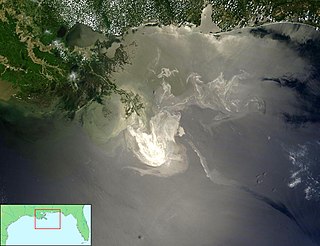
The Deepwater Horizon oil spill was an industrial disaster that began on 20 April 2010 off of the coast of the United States in the Gulf of Mexico on the BP-operated Macondo Prospect, considered to be the largest marine oil spill in the history of the petroleum industry and estimated to be 8 to 31 percent larger in volume than the previous largest, the Ixtoc I oil spill, also in the Gulf of Mexico. The United States federal government estimated the total discharge at 4.9 MMbbl. After several failed efforts to contain the flow, the well was declared sealed on 19 September 2010. Reports in early 2012 indicated that the well site was still leaking. The Deepwater Horizon oil spill is regarded as one of the largest environmental disasters in world history.
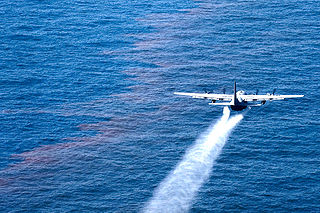
Corexit is a product line of oil dispersants used during oil spill response operations. It is produced by Nalco Holding Company, an indirect subsidiary of Ecolab. Corexit was originally developed by the Standard Oil Company of New Jersey. Corexit is typically applied by aerial spraying or spraying from ships directly onto an oil slick. On contact with the dispersant, oil that would otherwise float on the surface of the water is emulsified into tiny droplets and sinks or remains suspended in the water. In theory this allows the oil to be more rapidly degraded by bacteria (bioremediation) and prevents it from accumulating on beaches and in marshes.
Following is a Timeline of the Deepwater Horizon oil spill for May 2010.

An oil dispersant is a mixture of emulsifiers and solvents that helps break oil into small droplets following an oil spill. Small droplets are easier to disperse throughout a water volume, and small droplets may be more readily biodegraded by microbes in the water. Dispersant use involves a trade-off between exposing coastal life to surface oil and exposing aquatic life to dispersed oil. While submerging the oil with dispersant may lessen exposure to marine life on the surface, it increases exposure for animals dwelling underwater, who may be harmed by toxicity of both dispersed oil and dispersant. Although dispersant reduces the amount of oil that lands ashore, it may allow faster, deeper penetration of oil into coastal terrain, where it is not easily biodegraded.

The 2010 Deepwater Horizon oil spill in the Gulf of Mexico has been described as the worst environmental disaster in the United States, releasing about 4.9 million barrels of crude oil making it the largest marine oil spill. Both the spill and the cleanup efforts had effects on the environment.
The Health consequences of the Deepwater Horizon oil spill are health effects related to the explosion of the Deepwater Horizon offshore drilling rig in the Gulf of Mexico on April 20, 2010. An oil discharge continued for 84 days, resulting in the largest oil spill in the history of the petroleum industry, estimated at approximately 206 million gallons. The spill exposed thousands of area residents and cleanup workers to risks associated with oil fumes, particulate matter from Controlled burns, volatile organic compounds (VOCs), polycylic aromatic hydrocarbons (PAHs), and heavy metals.

The Deepwater Horizon oil spill occurred between 10 April and 19 September 2010 in the Gulf of Mexico. A variety of techniques were used to address fundamental strategies for addressing the spilled oil, which were: to contain oil on the surface, dispersal, and removal. While most of the oil drilled off Louisiana is a lighter crude, the leaking oil was of a heavier blend which contained asphalt-like substances. According to Ed Overton, who heads a federal chemical hazard assessment team for oil spills, this type of oil emulsifies well. Once it becomes emulsified, it no longer evaporates as quickly as regular oil, does not rinse off as easily, cannot be broken down by microbes as easily, and does not burn as well. "That type of mixture essentially removes all the best oil clean-up weapons", Overton said.
The Prince William Sound Regional Citizens' Advisory Council is an independent non-profit organization based in Anchorage and Valdez, Alaska, whose mission is to promote the environmentally-safe operation of the Alyeska Pipeline's Valdez Marine Terminal and associated oil tankers, and to inform the public of those activities.
On May 1, 2010, a ruptured ExxonMobil pipeline in the state of Akwa Ibom, Nigeria, spilled more than a million gallons into the delta and contributed to the major environmental issues in the Niger Delta. The spill had occurred at an Exxon platform some 20–25 miles (32–40 km) offshore which feeds the Qua Iboe oil export terminal. Exxon Mobil declared force majeure on Qua Iboe oil shipments due to the pipeline damage. The leakage in the Qua Iboe oil field discharged about 232 barrels of crude into the Atlantic Ocean contaminating the waters and coastal settlements in the predominantly fishing communities along Akwa Ibom and Cross River.
Oil pollution toxicity to marine fish has been observed from oil spills such as the Exxon Valdez disaster, and from nonpoint sources, such as surface runoff, which is the largest source of oil pollution in marine waters.

Merav Ben-David is an Israeli-American ecologist, zoologist, and politician who is the Chair of the Department of Zoology and Physiology at the University of Wyoming. She was the Democratic nominee in the 2020 United States Senate election in Wyoming, losing to former Congresswoman Cynthia Lummis in the general election. She ran for State Representative from Wyoming's 46th district in 2022.
